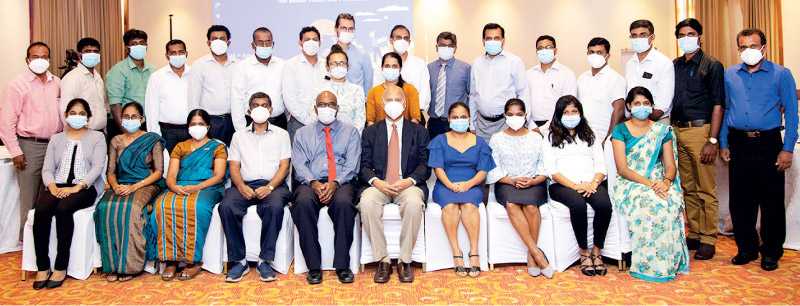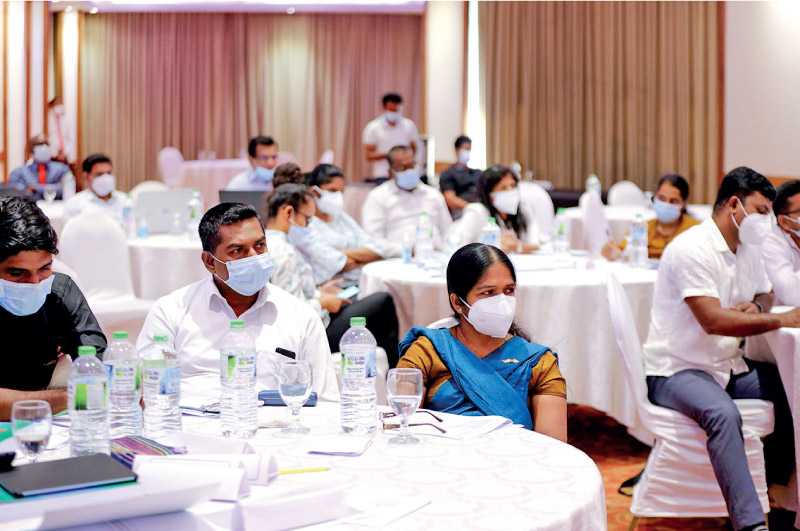Tuesday Feb 24, 2026
Tuesday Feb 24, 2026
Monday, 15 March 2021 02:38 - - {{hitsCtrl.values.hits}}

Participants of the training with PGIA Director Prof. Dematawewa, Dr. Andrew Jacque and Bart Provoost from TAMAP
An ‘Intensive Course on Agricultural Policy Analysis’ aimed at strengthening capacities of Sri Lanka’s agricultural institutions in policy analysis, design, and implementation, was conducted between 19 and 28 February with the participation of senior officials of central Government ministries, representatives from private sector organisations, and lecturers of national universities conducting agricultural policy analysis.
The course was organised by the EU-funded Technical Assistance to the Modernisation of Agriculture Programme (TAMAP) in collaboration with the Postgraduate Institute of Agriculture (PGIA), University of Peradeniya, and endorsed by the National Planning Department of the Ministry of Finance.
Harnessing growth prospects of Sri Lanka’s agriculture sector rely on selecting appropriate agricultural policy interventions. These interventions, together with reform of policies governing the agriculture sphere, serve as cornerstones in achieving the Sustainable Development Goals (SDGs) by 2030.
One of TAMAP’s main objectives is to support the Government of Sri Lanka in its efforts to improve the policy frameworks to enhance growth in the agricultural sector. TAMAP capacitates Sri Lanka’s public officials through in-depth research initiatives and impact assessments, but most importantly through the provision of appropriate on-the-job training on policy analysis and implementation.
The Intensive Course on Agricultural Policy Analysis’ provided participants with conceptual and analytical tools for economic analysis of agricultural policies.The course conceptualised by TAMAP’s policy advisors led to the development of a policy manual titled ‘Agricultural Policy Analysis: Concepts and Tools for Emerging Economies’ written by Sri Lankan and international academics. This manual, which was edited by Professor Jeevika Weerahera of the University of Peradeniya and Dr. Andrew Jacque of TAMAP, serves as the backbone of the training cycle and is expected to be published internationally in May 2021.
At the kick-off of the training, Anita Ryczan of the EU Delegation stated: “Agriculture and integrated rural development are among the key priorities of EU cooperation in Sri Lanka. Through projects like TAMAP, we support the Government and local communities to promote more inclusive and modernised agriculture that can create more growth and jobs. TAMAP works at the national, provincial, and district levels supporting different stakeholders in the sector. This course builds capacity for informed policy-making among officials and helps them to address complex policy challenges.”
PGIA Director Professor Dematawewa in his welcome address noted: “The development and delivery of this course are timely as it is of tremendous significance to strengthen the capacities of officials involved in policy. We are appreciative of TAMAP’s support in recognising the need to contribute to the growth of analytically informed, evidence-based discussions.”
TAMAP Team Leader Dr. Nihal Attapatu highlighted: “The TAMAP Program is fully rooted in supporting the Government to modernise Sri Lanka’s agriculture sector. Evidence-based and informed policy-making can play a crucial role in designing, implementing and delivering better public policies. However, effectively connecting evidence and policy-making remains a challenge. This course provides participants with concepts, tools and processes to examine policy situations in agricultural development and strengthen capacities.”
This pilot initiative is the first of a series of four trainings co-delivered by TAMAP and PGIA which will be delivered throughout 2021 in collaboration with Universities of Rajarata, Uva Wellassa and Jaffna.
Find out more info about TAMAP project: www.eusl-ruraldevelopment.org

Senior officials of central Government ministries, representatives from private sector organisations and lecturers of national universities were among the participants